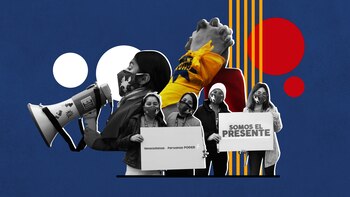
Kamila is 14 years old. He migrated from Venezuela to Lima four years ago. Although she was very young when she arrived and that made the experience “quite friendly”, now, she says, she begins to understand a lot of what it means to be gone.
“Leaving your country, leaving your home is hard enough. The uncertainty of not knowing if you're going to see your family again. At the time of migration I was ten years old, so I don't think I felt that pain. Obviously I missed it, but I didn't realize a lot of things. I think the most difficult experiences have to do with realizing that we only had family here. And since I've been in Peru for four years, I'm beginning to see and understand all the problems we experience as migrants: discrimination, xenophobia. Of course there are good things, but that was the hardest thing to grasp and accept.”
One day Kamila's mother told her about Quinta Ola — an association that seeks to promote and protect the rights of girls, adolescents and women — she told her that it offered a program for young people like her, Chamas en Acción (“chamas” means “girls” in Venezuela), and encouraged her to apply.
“It caught my attention a lot and I decided to join because I realized that it would help us improve in the situations we were experiencing. It was something very new for me and I was very interested in it. That's why I wanted to participate in the program and get into youth activism and feminism,” she says.

Valentina is also 14 years old and came to Peru from Venezuela four years ago. He migrated with his mother, his cousin and an uncle of his cousin. In her home country she left her grandparents, whom she saw every day, and her best friend since she was 5 years old, with whom she had shared, at that time, half her life.
“Leaving my country, my family and friends was not easy, I had to learn to adapt to a new lifestyle; at first I was a bit shocked but after a few months everything was different,” he says. “Xenophobia was one of the things that shocked me the most when I arrived, mostly because I spent most of the day at school and I had classmates who made fun of me for being Venezuelan. It was quite awkward times but I appreciate that it is no longer the case,” he adds.
Valentina also received information about Chamas in Action from her mother to whom, in turn, an acquaintance had sent it to her. “I saw that the program dealt with topics that had always seemed interesting to me (feminism, empowerment, working against racism and other social issues) but I had never given myself the task of investigating them further, so I thought it was a good idea to sign up.”
Like Kamila, like Valentina, 50 Venezuelan migrant teenagers between 13 and 17 years old in 2021 and 40 others in 2022 joined in this program created by the Quinta Ola association, which convened them to provide them with tools to deal with the situations they live in their daily lives, so that develop leadership skills and find a peer space where they can weave networks to facilitate integration. And from that basis, contribute to the construction of a society free from violence and discrimination.
Political empowerment
Gianina Marquez —Master in Gender Studies—, Beatriz Córdova —political scientist and also a master's degree in Gender Studies—and Karina Nuñez —a communicator for development and master's degree in Sociology—are feminist activists and co-founders of Quinta Ola: “An openly feminist association that seeks to protect and defend the rights of girls, adolescents and women in their diversity through educational, cultural, advocacy activities and what our imagination and our desires tell us,” Marquez describes.
GirlGov Peru was the first program offered by Marquez, Córdova and Nuñez. After it was completed by a first litter, the association was formally born.
“GirlGov Peru is a political empowerment program for girls and adolescents in Peru. It emerged in 2018. The three of us said: we want a program aimed at girls and adolescents, we organize ourselves and we take it out by pure self-management, asking for donations and knocking on doors. As we realized that no one knew who was behind GirlGov Peru, we set out to make our work and that of all the women who participated visible, because there were volunteers and colleagues who supported us along the way. At the end of 2019 we decided to become an organization,” says Marquez.
“We started with the work that we felt needed to be done in Peru. This first empowerment program aimed at girls and adolescents between the ages of 13 and 17 consists of workshops in which we reflect and discuss various social issues, including the violence that we experience as girls, adolescents and women,” adds Córdova.
She continues: “GirlGov has this capacity-building component but also another mentoring component in which we accompany adolescent girls to get to work through an initiative once this process of reflection and collective knowledge has been done. The one born to them, depending on their interests. And in these mentorships we accompany them in the construction of these initiatives that have become, for example, adolescent groups, a specific campaign or an Instagram profile to inform and make certain issues visible.”

The line of space, they emphasize, is that it be “feminist and not adultocentric”. They had noticed that teenage girls often did not have places to feel safe to talk and share their views, experiences and concerns, so they decided to offer them one. In the first edition of GirlGov Peru, 70 teenagers were registered. And in the second, in 2020, changing the modality from face-to-face to virtual due to the COVID-19 pandemic, 100. In 2021, 100 more.
“Adolescent girls have to face diverse challenges, they focus on different issues such as defending their rights to access education, to live a life free from discrimination, against racism, against discrimination against the LGBTI community. In the course of their research, they prepared surveys, collected information at the national level on how the pandemic was affecting adolescents and presented the results to national authorities, ministries, congressmen,” adds Nuñez.
It was when the number of participants confirmed that there was a need that the creators of the space formalized the association. Quinta Ola refers to the waves of feminism, “honoring the path that women have built before us and recognizing that we are still in a constant struggle. We want it to include the voices of girls and adolescents, which is a bit the focus with which Quinta Ola is born”, says Córdova.
Against xenophobia
In 2019, GirlGov Peru received recognition within the Javier Pérez de Cuéllar Human Rights Award, granted by the French Embassy. After seeing the results it had, the German Society for International Cooperation (GIZ), an agency that supports sustainable development projects around the world, proposed to Quinta Ola to do something similar for adolescent migrants, refugees and asylum seekers in Peru.
“We made a state of situation of adolescent Venezuelan migrants, specifically in metropolitan Lima and Callao. We then developed a proposal based on the issues we thought we should focus on, since there are different levels in the empowerment process and migrant adolescent girls had to start at the most basic one because they had to recognize themselves as subjects of law to, from that, move forward”, Marquez account.
Once this analysis had been carried out, the basic programme was restructured in line with the needs of adolescent migrant girls and the new objectives. This led to three interrelated projects: Chamas in Action aimed at adolescent migrants; Families Without Borders, for the family environment of young women, and Chama-Hermana, aimed at Peruvian adolescent activists, “because not only must we work with the subject who is going to be in the process of change, but they have to strengthen the environments closest to it and generate support networks, and these groups were already sensitized and we knew that they would have an openness to include a struggle for peaceful communities, free of xenophobia,” explains Marquez.

“Peru is one of the most recurrent destinations for Venezuelan migrants, refugees and asylum-seekers. And violence and stereotypes about the Venezuelan community have felt very strongly: in the media, public institutions (because there is also institutionalized xenophobia) and society in general. Xenophobia is something that Venezuelan teenagers experience and the search for a safe environment where they could share with others who are experiencing similar situations appealed to them,” says Córdova.
Chamas en Acción, like GirlGov Peru, offers spaces for reflection, working committees to strengthen activism and mentoring to take action. It also has a “comprehensive strategy for psychosocial accompaniment, because migrant adolescents arrive with different situations and states of mental health, so we consider it important that our work axes include a transversal one of individual and community healing,” says Marquez.
The workshops and analysis spaces focus on human rights and gender-based violence based on the experiences of young women and how it manifests itself in their communities. From their experiences, the coordinators reveal which situations are at risk, which mechanisms reproduce violence in their environment and which public institutions do nothing to protect them. With this information they create advocacy or communication campaigns. Then they put the focus on activism, so that program participants have tools to do something about those problems or situations. At this stage, Peruvian adolescent activists with experience in implementing initiatives related to the fight against gender-based violence are invited to participate.
“Through the representation and inspiration of the peer group, they can form their own collectives or define their own activism actions in the future,” Marquez says.

Kamila formed her own group, which is called Atenisa and has an Instagram profile “that focuses on making visible the hypersexualization of Venezuelan migrant girls and adolescents living in Lima,” says the young activist. “We thought it was a problem that had to be addressed because it was not very visible and it was very normalized. Most of the girls who are on the show live hypersexualization, the sexualization of our bodies, the harassment, so that's where it came from,” she says.
The program includes supports for families “so that they too feel empowered to propose solutions, because sometimes we see them as passive subjects who only receive information, but they can also be focal points for strengthening communities around the prevention of violence, xenophobia,” they explain in the association .
Results
For this project, Quinta Ola was recognized by the United Nations High Commissioner for Refugees (UNHCR) with the 2022 Regional Innovation Award for the Americas. “Of the 481 organizations that applied, only seven won and we are one, the only one in the region of the Americas,” Nuñez emphasizes. This award is presented annually to organizations that seek to transform the reality of refugees and displaced persons through innovative methods and approaches. This year's, announced on March 8, International Women's Day, recognize the role of women-led organizations working in the context of forced displacement.

Beyond this award, the results of Chamas en Acción can be seen both in the call it has and in what the participants say and do: “My experience has been very interesting and enriching, I have learned a lot about activism, as well as from myself. I really like learning and talking about problems that affect Venezuelan adolescent migrant girls, I think it is very important to make them visible and give them the importance they deserve,” says Valentina.
Kamila agrees: “[On the program] I met a lot of very good people, contacts and friends. I learned about activism, about the problems we experience as adolescents, as women, as migrant girls. About feminism. It is comforting to know that I found this place and that it has helped me grow and develop as the person I am. And what I like most is that everything we learned we have been able to put into practice, we manage to start an action, an activism, we advocate. This program gives us opportunities to change society and teach people about what we live.”
______
This note is part of the Solutions for Latin America platform, an alliance between INFOBAE and RED/ACTION.
Últimas Noticias
Debanhi Escobar: they secured the motel where she was found lifeless in a cistern
Members of the Specialized Prosecutor's Office in Nuevo León secured the Nueva Castilla Motel as part of the investigations into the case

The oldest person in the world died at the age of 119
Kane Tanaka lived in Japan. She was born six months earlier than George Orwell, the same year that the Wright brothers first flew, and Marie Curie became the first woman to win a Nobel Prize

Macabre find in CDMX: they left a body bagged and tied in a taxi
The body was left in the back seats of the car. It was covered with black bags and tied with industrial tape
The eagles of America will face Manchester City in a duel of legends. Here are the details
The top Mexican football champion will play a match with Pep Guardiola's squad in the Lone Star Cup

Why is it good to bring dogs out to know the world when they are puppies
A so-called protection against the spread of diseases threatens the integral development of dogs




